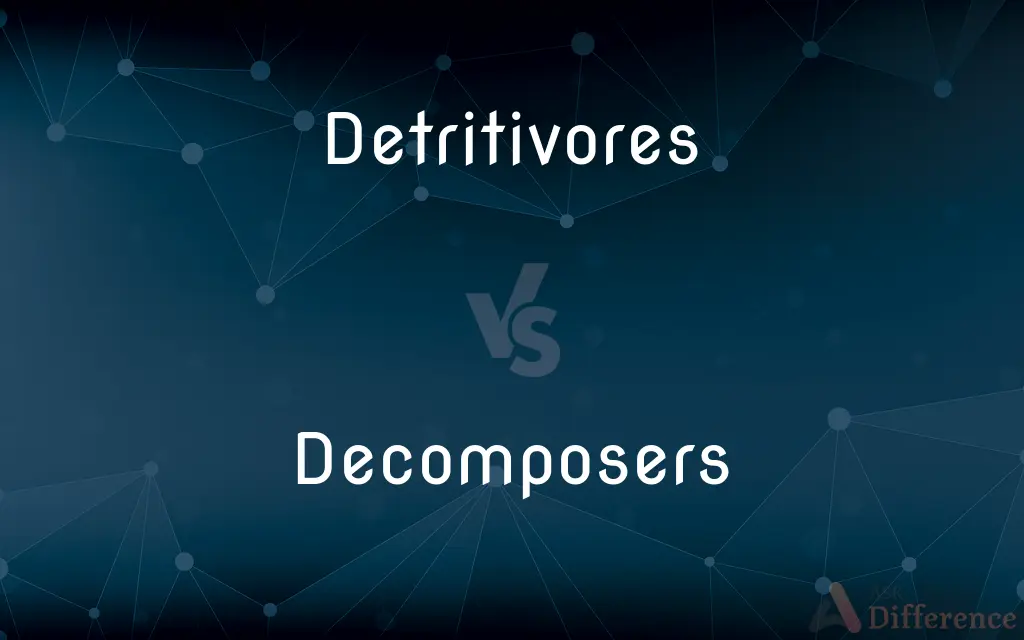Detritivores vs. Decomposers — What's the Difference?
Edited by Tayyaba Rehman — By Fiza Rafique — Published on December 26, 2023
Detritivores consume organic waste and debris, while Decomposers break down dead organisms on a molecular level.

Difference Between Detritivores and Decomposers
Table of Contents
ADVERTISEMENT
Key Differences
Detritivores and Decomposers both play critical roles in recycling organic matter within ecosystems. Detritivores are organisms that physically consume decomposing organic material, typically plant and animal remains. This act of consumption not only provides Detritivores with nutrition but also assists in breaking down larger organic matter into smaller parts. Decomposers, on the other hand, are typically microorganisms like bacteria and fungi that chemically break down dead or decaying organisms into simpler substances.
Within an ecosystem, Detritivores such as worms, millipedes, and certain types of insects act as the first line of the decomposition process. By eating decaying matter, Detritivores aid in fragmenting dead organisms, making it more accessible for Decomposers. Decomposers, in their role, further break down this fragmented organic material on a cellular or molecular level, turning it into nutrients like nitrogen and carbon that can be re-absorbed by plants.
It's important to note that while Detritivores and Decomposers are both essential for nutrient cycling, they differ in their approach to decomposition. Detritivores are more about physical breakdown through consumption, whereas Decomposers tackle decomposition chemically. A decomposing log, for instance, may first be fed upon by Detritivores like beetles and then further broken down by Decomposers like fungi.
In summary, while Detritivores chew, ingest, and fragment organic material into smaller pieces, Decomposers utilize chemical processes to convert this material into fundamental components, thus completing the cycle of decomposition and nutrient recycling in ecosystems.
Comparison Chart
Type of Organisms
Larger organisms like worms, insects
Microorganisms like bacteria, fungi
ADVERTISEMENT
Method of Decomposition
Physical consumption
Chemical breakdown
Role in Ecosystem
Fragment organic material
Convert organic material to basic nutrients
Size of Organic Matter
Process larger organic debris
Break down smaller, fragmented organic matter
Examples
Earthworms, beetles
Bacteria, fungi
Compare with Definitions
Detritivores
Detritivores play a role in fragmenting organic debris.
By feeding on fallen leaves, Detritivores aid in starting the decomposition process.
Decomposers
Decomposers chemically break down organic matter.
Fungi act as Decomposers, converting dead wood into basic nutrients.
Detritivores
Detritivores are organisms that consume decomposing matter.
Earthworms are Detritivores that feed on decaying plant material.
Decomposers
Decomposers are primarily microorganisms.
Bacteria are key Decomposers in many ecosystems.
Detritivores
Detritivores are often visible to the naked eye.
Many garden Detritivores, like beetles, can be spotted without a microscope.
Decomposers
Decomposers work on a molecular or cellular level.
On a fallen tree, Decomposers break down the cellular structures over time.
Detritivores
Detritivores obtain nutrition from dead organic materials.
The diet of Detritivores consists mainly of dead plants and animals.
Decomposers
Decomposers recycle nutrients back into the soil.
Plants rely on Decomposers to transform dead matter into usable nutrients.
Detritivores
Detritivores accelerate the decomposition process.
Detritivores, like millipedes, quicken the breakdown of organic matter in forests.
Decomposers
Decomposers are essential for nutrient cycling.
Without Decomposers, ecosystems would be overwhelmed with dead organic material.
Detritivores
Plural of detritivore
Decomposers
An organism, often a bacterium or fungus, that feeds on and breaks down dead plant or animal matter, thus making organic nutrients available to the ecosystem.
Decomposers
Plural of decomposer
Common Curiosities
Are Detritivores always insects?
No, Detritivores can be various organisms, including insects, worms, and crustaceans.
Why are Decomposers vital in ecosystems?
Decomposers help convert dead organic material into basic nutrients, facilitating nutrient cycling.
Can Decomposers be seen with the naked eye?
Most Decomposers, like bacteria and fungi, are microscopic, whereas many Detritivores, like worms, are visible.
What's a common environment to find Detritivores?
Detritivores are often found in soil, forests, and other areas with abundant decaying organic material.
What are Detritivores?
Detritivores are organisms that consume decomposing organic material for nutrition.
How do Decomposers function differently from Detritivores?
Decomposers chemically break down organic matter, while Detritivores physically consume and fragment it.
Do Decomposers exist in every ecosystem?
Yes, Decomposers are found in almost every ecosystem, from deserts to oceans.
Are Detritivores always beneficial?
Mostly, yes. They aid in decomposition and nutrient cycling. However, in certain contexts, they might be pests.
Do Detritivores and Decomposers compete for food?
Not really. Detritivores fragment organic material, making it easier for Decomposers to chemically break it down.
What would happen if there were no Detritivores in an ecosystem?
Without Detritivores, large organic debris would accumulate, slowing down the decomposition process.
Can plants be Decomposers?
No, plants aren't Decomposers. Decomposition is primarily done by microorganisms.
Why don't dead leaves and animals accumulate indefinitely in nature?
Both Detritivores and Decomposers work together to break down and recycle dead organic material.
Can Detritivores be considered recyclers?
Yes, Detritivores play a crucial role in recycling organic matter back into the ecosystem.
How do Decomposers affect soil health?
Decomposers enrich the soil by breaking down organic matter into nutrients plants can absorb.
Is a vulture a Decomposer?
No, a vulture is a scavenger. While it feeds on dead animals, it doesn't chemically break down organic material like Decomposers.
Share Your Discovery

Previous Comparison
Kodiak Bear vs. Grizzly Bear
Next Comparison
Covalent Molecular vs. Covalent NetworkAuthor Spotlight
Written by
Fiza RafiqueFiza Rafique is a skilled content writer at AskDifference.com, where she meticulously refines and enhances written pieces. Drawing from her vast editorial expertise, Fiza ensures clarity, accuracy, and precision in every article. Passionate about language, she continually seeks to elevate the quality of content for readers worldwide.
Edited by
Tayyaba RehmanTayyaba Rehman is a distinguished writer, currently serving as a primary contributor to askdifference.com. As a researcher in semantics and etymology, Tayyaba's passion for the complexity of languages and their distinctions has found a perfect home on the platform. Tayyaba delves into the intricacies of language, distinguishing between commonly confused words and phrases, thereby providing clarity for readers worldwide.
















































